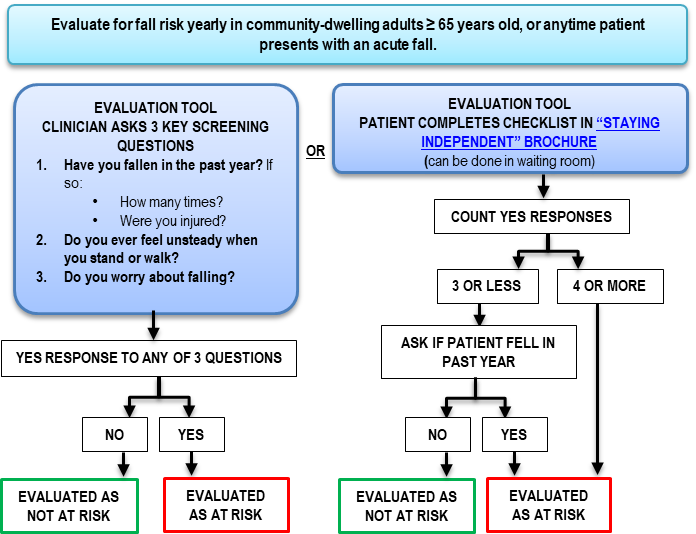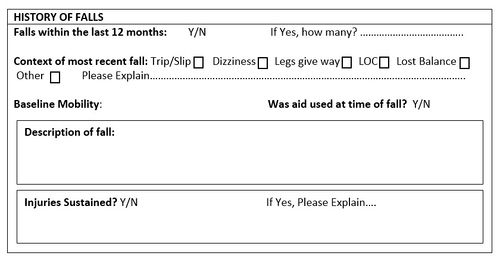Getting My Dementia Fall Risk To Work
Getting My Dementia Fall Risk To Work
Blog Article
Dementia Fall Risk for Dummies
Table of ContentsDementia Fall Risk Things To Know Before You BuyOur Dementia Fall Risk DiariesA Biased View of Dementia Fall RiskAll About Dementia Fall RiskDementia Fall Risk - The Facts
The FRAT has 3 sections: drop danger status, threat aspect checklist, and activity strategy. A Fall Threat Condition includes information regarding background of current falls, medicines, psychological and cognitive standing of the individual - Dementia Fall Risk.If the client ratings on a danger factor, the equivalent number of factors are counted to the client's loss danger rating in the box to the far best. If a client's loss risk rating totals five or greater, the person is at high threat for falls. If the individual ratings only four factors or lower, they are still at some danger of dropping, and the registered nurse ought to utilize their best medical analysis to manage all loss danger factors as part of an alternative treatment plan.
These common approaches, generally, help create a secure setting that minimizes unintended drops and defines core precautionary steps for all clients. Signs are vital for patients at threat for drops. Doctor need to acknowledge that has the problem, for they are accountable for implementing activities to advertise client safety and protect against drops.
The Facts About Dementia Fall Risk Revealed
Wristbands must consist of the patient's last and very first name, day of birth, and NHS number in the UK. Information need to be printed/written in black versus a white history. Just red color ought to be utilized to indicate unique person standing. These recommendations follow present growths in person recognition (Sevdalis et al., 2009).
Items that are too far might require the patient to connect or ambulate needlessly and can possibly be a threat or add to drops. Assists avoid the client from going out of bed without any assistance. Nurses react to fallers' telephone call lights faster than they do to lights launched by non-fallers.
Visual disability can significantly create falls. Keeping the beds closer to the flooring reduces the danger of falls and significant injury. Placing the cushion on the floor dramatically minimizes fall danger in some healthcare settings.
A Biased View of Dementia Fall Risk
Individuals that are high and with weak leg muscles who try to rest on the bed from a standing setting are most likely to drop onto the bed because it's as well reduced for them to lower themselves safely. Likewise, if a tall individual efforts to stand up from a reduced bed without assistance, the client is likely to fall back down onto the bed or miss out on the bed and drop onto the flooring.
They're designed to advertise prompt rescue, not to avoid drops from bed. Distinct alarm systems can additionally advise the person not to rise alone. Using alarm systems can likewise be an alternative to physical restraints. Other than bed alarms, increased guidance for useful site risky individuals also may help prevent drops.

Individuals with a shuffling stride increase autumn opportunities drastically. To lower fall danger, footwear need to be with a little to no heel, thin see post soles with slip-resistant walk, and sustain the ankle joints.
The Greatest Guide To Dementia Fall Risk
In a study, homes with sufficient lighting report less falls (Ramulu et al., 2021). Renovation in illumination at home might lower loss rates in older grownups.

Caretakers work for assuring a secure, protected, and secure setting. Nevertheless, research studies showed very low-certainty proof that sitters lower autumn danger in More Info intense treatment healthcare facilities and just moderate-certainty that alternatives like video tracking can lower caretaker usage without increasing fall danger, recommending that caretakers are not as beneficial as originally thought (Greely et al., 2020).
How Dementia Fall Risk can Save You Time, Stress, and Money.

Increased physical fitness reduces the danger for drops and limits injury that is endured when loss transpires. Land and water-based workout programs might be similarly helpful on balance and gait and consequently reduce the danger for drops. Water workout might contribute a positive advantage on equilibrium and gait for women 65 years and older.
Chair Increase Workout is a simple sit-to-stand exercise that assists enhance the muscular tissues in the thighs and buttocks and enhances wheelchair and freedom. The objective is to do Chair Rise exercises without making use of hands as the client comes to be stronger. See resources area for a thorough guideline on how to carry out Chair Increase exercise.
Report this page